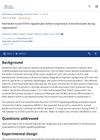 7 citations,
December 2020 in “Clinics in Dermatology”
7 citations,
December 2020 in “Clinics in Dermatology” Some alopecia treatments might help treat COVID-19, but more research is needed.
 1 citations,
July 2019 in “Medicina Clínica (English Edition)”
1 citations,
July 2019 in “Medicina Clínica (English Edition)” Tofacitinib partially improved hair regrowth in a patient with severe hair loss.
June 2020 in “Dermatologic therapy” Using Janus kinase inhibitors (JAKi) in COVID-19 treatment requires careful consideration due to their immunosuppressive effects.
 2 citations,
November 2014 in “The journal of investigative dermatology/Journal of investigative dermatology”
2 citations,
November 2014 in “The journal of investigative dermatology/Journal of investigative dermatology” Oral tofacitinib can treat both psoriasis and alopecia universalis by normalizing inflammatory pathways.
 August 2021 in “Revista Colombiana de Reumatología/Revista Colombiana de Reumatologia”
August 2021 in “Revista Colombiana de Reumatología/Revista Colombiana de Reumatologia” Janus kinase inhibitors may effectively treat severe alopecia areata unresponsive to other treatments.
 70 citations,
April 2016 in “Experimental Dermatology”
70 citations,
April 2016 in “Experimental Dermatology” A patient with alopecia areata regrew hair after taking tofacitinib and showed changes in certain blood and skin markers.
 39 citations,
April 2016 in “Case Reports in Dermatology”
39 citations,
April 2016 in “Case Reports in Dermatology” Tofacitinib temporarily regrew hair in a man with alopecia, but its effects didn't last.
 May 2011 in “Value in Health”
May 2011 in “Value in Health” CP-690,550 significantly reduced itching in patients with moderate-to-severe plaque psoriasis.
 20 citations,
January 2017 in “Actas Dermo-Sifiliográficas”
20 citations,
January 2017 in “Actas Dermo-Sifiliográficas” Recent advances in hair loss treatments show significant progress.
 2 citations,
January 2023 in “Journal of Education, Health and Sport”
2 citations,
January 2023 in “Journal of Education, Health and Sport” Cognitive-behavioral therapy with habit reversal training is the most effective treatment for trichotillomania.
50 citations,
May 2021 in “Frontiers in immunology” Certain immune cells contribute to skin autoimmune diseases, and some treatments can reverse hair loss in these conditions.
 August 2024 in “EMJ Dermatology”
August 2024 in “EMJ Dermatology” Non-scarring alopecia in females affects emotional well-being and requires accurate diagnosis and personalized treatment.
 15 citations,
January 2020 in “Experimental Dermatology”
15 citations,
January 2020 in “Experimental Dermatology” The document concludes that understanding and treatments for alopecia areata have significantly advanced, now recognizing it as an autoimmune disorder.
 November 2024 in “Medicina”
November 2024 in “Medicina” Recognizing scalp symptoms in PRP is crucial for proper diagnosis and treatment.
23 citations,
October 2020 in “Anais brasileiros de dermatologia/Anais Brasileiros de Dermatologia” Tailored treatments for alopecia areata are recommended based on severity and patient needs.
 11 citations,
November 2015 in “Experimental Dermatology”
11 citations,
November 2015 in “Experimental Dermatology” The conclusion is that the IL-6/STAT3 activation affects p63 expression in healing wounds, which may help in hair follicle regeneration.
2 citations,
May 2020 in “JAAD case reports” Ruxolitinib can cause a delayed skin reaction on the nose.
 October 2023 in “Frontiers in Medicine”
October 2023 in “Frontiers in Medicine” Dupilumab helped a 4-year-old grow hair back after another treatment failed.

The authors suggest that 5-α-reductase inhibitors, like dutasteride, are effective in treating frontal fibrosing alopecia and should be the first-line treatment, with other options for severe cases. They also recommend further research on Janus kinase inhibitors.
 January 2024 in “Dermatologic therapy”
January 2024 in “Dermatologic therapy” Tofacitinib is a safe treatment for hair loss in children, but long-term use may be needed for best results.
 July 2023 in “IntechOpen eBooks”
July 2023 in “IntechOpen eBooks” Some types of hair loss can be reversed, others are permanent, and treatments vary by type.
 October 2021 in “Journal of the European Academy of Dermatology and Venereology”
October 2021 in “Journal of the European Academy of Dermatology and Venereology” There have been major advances in diagnosing and treating hair loss over the last 30 years, with new drugs and improved hair transplant techniques.
25 citations,
December 2017 in “The journal of investigative dermatology. Symposium proceedings/The Journal of investigative dermatology symposium proceedings” Targeted cytokine treatments may help with alopecia areata, but more research is needed.
 May 2023 in “International Journal of Trichology”
May 2023 in “International Journal of Trichology” Tofacitinib may be an effective and safe treatment for hair loss in teenagers with alopecia areata.
 3 citations,
February 2022 in “Rheumatology”
3 citations,
February 2022 in “Rheumatology” Baricitinib was effective in treating a patient with dermatomyositis and hair loss.
 January 2024 in “Journal of Biosciences and Medicines”
January 2024 in “Journal of Biosciences and Medicines” Future treatments for androgenic alopecia may focus on reactivating hair follicle stem cells and improving drug delivery.
December 2023 in “Journal of clinical medicine” Some leukemia treatments can cause skin reactions similar to keratosis pilaris.
 April 2023 in “International Journal of Research in Dermatology”
April 2023 in “International Journal of Research in Dermatology” Baricitinib is a promising treatment for severe alopecia areata with minimal side effects.
 July 2023 in “Journal of the European Academy of Dermatology and Venereology”
July 2023 in “Journal of the European Academy of Dermatology and Venereology” Hair loss can indicate various health issues, including serious diseases, hormonal imbalances, and can significantly affect personal life and mental health.
 December 2023 in “Journal of Ayub Medical College Abbottabad”
December 2023 in “Journal of Ayub Medical College Abbottabad” Ritlecitinib effectively treats alopecia areata in patients 12 and older with fewer side effects.
























